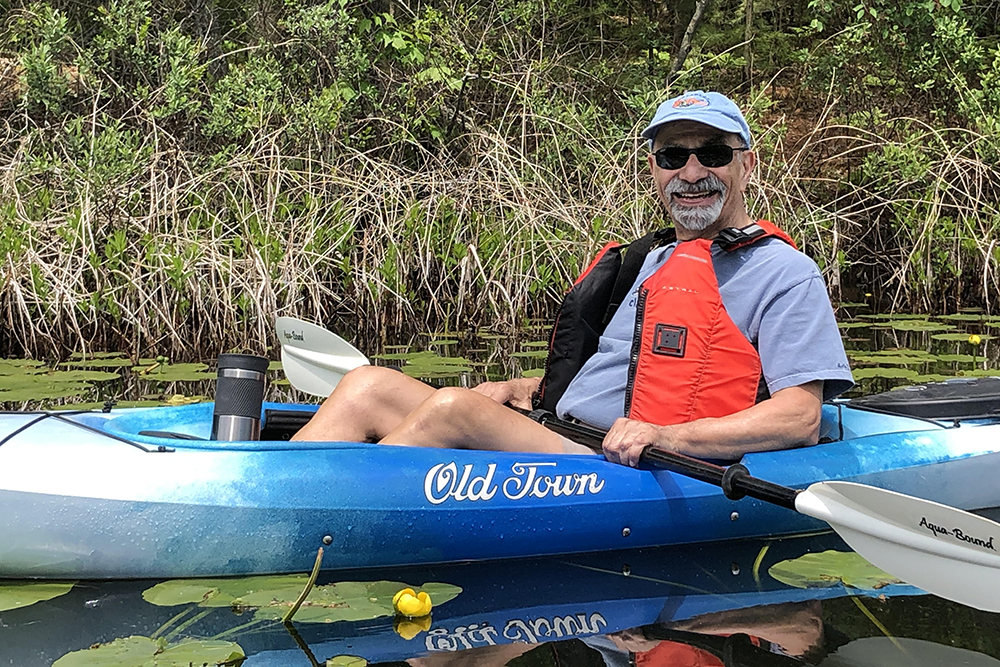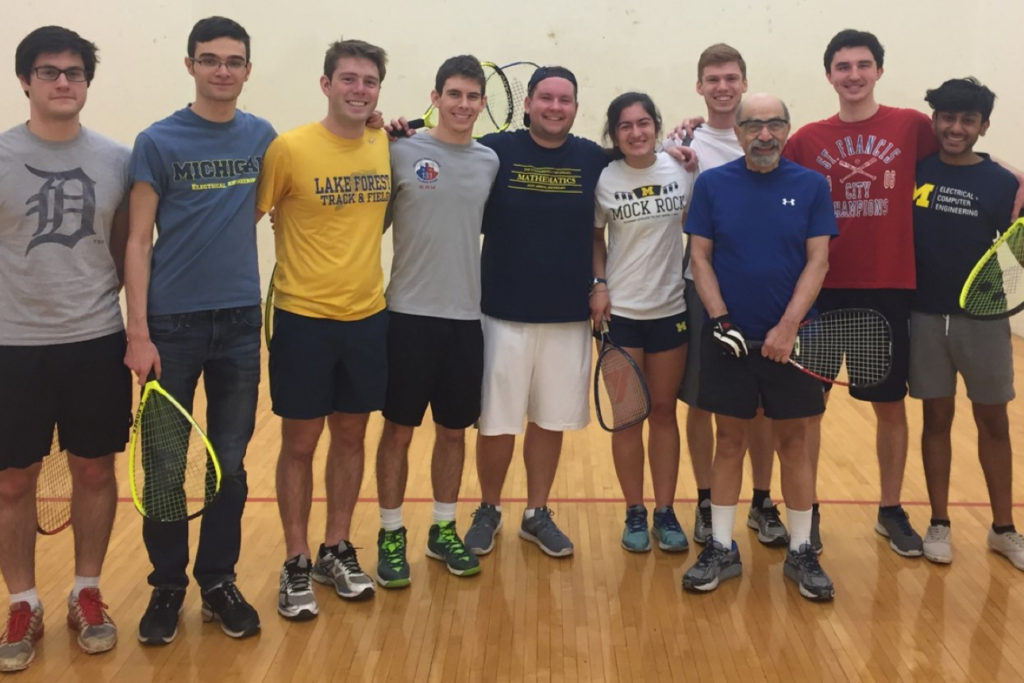Fawwaz Ulaby retires after nearly four decades of championing students and excelling at research and leadership

Fawwaz Ulaby, the Emmett Leith Distinguished University Professor of EECS, Chen-To Tai Professor of Engineering, and Arthur F. Thurnau Professor, is saying farewell after thirty-seven years of teaching at the University of Michigan.
“He is the most kind and caring person you can find and wish to have as friend,” said Kamal Sarabandi, the Rufus S. Teesdale Professor of Engineering and Director of the Radiation Laboratory. “I wish him health, happiness, and long life for his retirement years.”
Research legacy
Ulaby is an internationally renowned researcher in the fields of terahertz technology and microwave remote sensing. His scholarship has resulted in more than 700 scientific papers and 16 books.
“Fawwaz has an uncanny talent to identify the most impactful research topics and see the big picture and at the same time be able to find the most intuitive solutions for the most complex problems,” Sarabandi said. “He is truly an academician par excellence, a role model who has inspired me and many of my colleagues.”
He is truly an academician par excellence, a role model who has inspired me and many of my colleagues.
Prof. Kamal Sarabandi
Ulaby was elected to the National Academy of Engineering (NAE) in 1995, “For contributions to the science and technology of radar remote sensing and its applications.” Election to the NAE is one of the highest professional honors bestowed on engineers. He also received the IEEE Edison Medal in 2006, “For pioneering research in microwave and radar remote sensing technology and their environmental and industrial applications.” The Edison Medal, named after Thomas Alva Edison, is the most prestigious award given in the United States and Canada recognizing meritorious accomplishments in the fields of electronics and electrical engineering.
“Many of his papers are still being quoted decades later, which shows you how seminal a lot of his work is,” said Dr. Émilie van Deventer (BSE MSE PhD EE 1985, 1986, 1992), who worked with Ulaby on some of his early research at U-M and is currently the Head of the Radiation and Health Unit at the World Health Organization.
Ulaby has directed large, interdisciplinary NASA projects aimed at the development of high-resolution satellite radar sensors for mapping earth’s terrestrial environment. These remote sensing systems now fly aboard satellites operated by NASA as well as the European, Canadian, and Japanese space agencies.
He also designed the first radar to fly in space. The home of his radar system was aboard Skylab, America’s first space station.
Ulaby served as the founding Director of a NASA-funded Center for Space Terahertz Technology at Michigan, and he received the NASA/Department of the Interior William Pecora Award in 2002.
Of all his research accomplishments, Ulaby said he’s proudest of leading the transformation of qualitative to quantitative in remote sensing.
“My main effort was to build a knowledge base in the form of data and models that explain how nature behaves when viewed by radar at a certain wavelength and a certain inclination,” said Ulaby. “We created a manual of data, which then was used by companies and universities worldwide.”
As a leader in the professional community, Ulaby’s influence has been far-reaching. He served as founding President of the IEEE Geoscience and Remote Sensing Society, as Editor-In-Chief of the Proceedings of the IEEE, and as Vice President for Research at the University of Michigan from 1999 to 2005.
In recognition of his outstanding career, Ulaby was named the University of Michigan Henry Russel Lecturer for 2014. This award is the University’s highest honor for a senior faculty member.
In addition to his service to the professional community, he serves on the National Academies Committee on Human Rights, which works to free scientists, engineers, and health professionals around the world who have been detained or imprisoned for exercising their basic human rights.
Educational Legacy
Ulaby is known for his personalized and compassionate approach to teaching, and his classes feature attendance rates of higher than 95%. Despite teaching large classes that may have over 100 students enrolled, Ulaby made a point to meet with every single student individually at the start of the term.
“That was definitely something that stuck with me,” said Matt Lamb, a former undergraduate student of Ulaby’s who graduated this spring with degrees in Electrical Engineering and Violin Performance. “I’ve never had another professor do that, and it was clear that he really cared.”
Lamb also benefited directly from one of Ulaby’s most ambitious projects: the free textbook initiative. The goal of the initiative is to ease the financial burden of college students in engineering courses by offering newly-published books for free online and “at cost” in hard cover. Ulaby began the initiative by partnering with Michigan Publishing to release three of his textbooks for free online. Now, many more faculty authors have joined with him, sacrificing their own royalties.
“We have about 400 colleges and universities using those books, and we’ll be adding more soon,” said Ulaby. “The authors are genuinely wonderful people who care more about the subject than the money. Because of their generosity, students have saved over $10 million.”
Lamb was one of the tens of thousands of students benefiting from Ulaby’s free textbooks, and the content sparked his interest in Analog Integrated Circuit design, which is what he will be studying as a master’s student at U-M this year. In recognition of Ulaby’s impact on his life and career, Lamb invited Ulaby to his senior violin recital.
“I could only invite a handful of people, and I thought about who would be the most meaningful,” Lamb said. “Professor Ulaby definitely was one of the most impactful professors I had at Michigan, so I wanted him to be there, and he actually changed his schedule so he could come. I couldn’t believe it. He’s probably the most genuine professor I’ve ever had.”
Professor Ulaby definitely was one of the most impactful professors I had at Michigan.
ECE undergrad Matt Lamb
Van Deventer, who worked as a Professor at the University of Toronto before joining WHO, said Ulaby’s textbooks and teaching styles inspired her own instruction approach.
“It’s really his mentorship and the way he deals with students,” she said. “He’s always been a bit of a father figure to me. I just adore him.”
Van Deventer most remembers how Ulaby would go out of his way to make students feel welcome. Every year, he would invite students, especially those who were international or out of state, to his house for Thanksgiving.
“I don’t know of any other professors who did that,” she said. “It felt like we were part of a big family.”
Many students express similar appreciation for the goals Ulaby sets in the classroom.
“Grades are not the most important thing to him,” said PhD student Menglou Rao, who took one of his graduate courses. “He cares more about how students feel, what they learn, and their future goals. He’s always focused on the big picture.”
He cares more about how students feel, what they learn, and their future goals.
PhD student Menglou Rao
Rao said Ulaby has been one of the most important mentors in her career. They play racquetball regularly, and she said he’s always happy to share stories and advice from his long career. In particular, Rao said he was especially supportive to her when she struggled in her classes early in her doctorate.
“He was so warm and encouraging and helped me believe in myself,” Rao said. “I consider him like family.”

Ulaby has also served as an important mentor for Madeline Evans, an undergraduate student who graduated with a degree in Electrical Engineering last spring.
“It was a bit nerve wracking for me, because there’s just so many more men in electrical engineering, but Professor Ulaby was really inspiring to talk to,” Evans said. “He was one of the best professors that I’ve ever had.”
Upon learning more about her interests, Ulaby helped her connect with Christopher Ruf, a Professor of Climate and Space Sciences and Engineering with a courtesy appointment in ECE. She now works as a research assistant for Ruf on a project that uses remote sensing to track microplastics in the ocean, an opportunity that has helped shape her academic career and professional goals.
“As instructors, we’re there to do the best job we can for that student to learn in the best possible way,” Ulaby said. “I want to learn about their life and why they’re in the course and what they’re hoping to achieve. Once that connection is established, they come back over and over to ask questions and improve their understanding.”
As instructors, we’re there to do the best job we can for that student to learn in the best possible way.
Prof. Fawwaz Ulaby
In 2012, Ulaby received the IEEE James H. Mulligan Education Medal, “For contributions to undergraduate and graduate engineering education through innovative textbooks, dedicated mentoring of students, and inspirational teaching.” He’s been named the Professor of the Year in ECE by the Beta-Epsilon chapter of Eta Kappa Nu (HKN), the national honor society for electrical and computer engineers, three times. This award is given based on popular vote by all undergraduate and graduate students in programs administered by the EECS department.
In addition, Ulaby received the national HKN C. Holmes MacDonald Outstanding Teaching Award in 1975. He’s served as thesis advisor to 115 graduate students, many of whom are leaders in academia and industry.
“Michigan is very conducive to creativity and to success,” Ulaby said. “I got recruited to a number of schools over the years, but I always turned them down, because nothing can compare to Michigan.”
 MENU
MENU 
